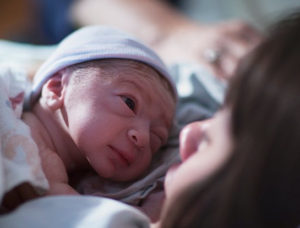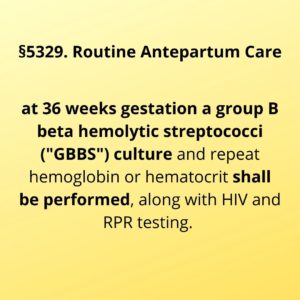Please read the disclaimer.
Group B Strep (or GBS) is a bacteria that lives in our large intestines. We all have it. It is part of our normal gut flora. Sometimes, this bacteria travels from the anus to the vagina. When it does, there are no symptoms. No odor. It may come and go, and come back again. In fact, the only way to know when the vagina has been colonized is to test for it. It is not sexually transmitted. It is not a matter of cleanliness. Most of the time, it is not an issue. The only time it is an issue is when a person is pregnant.
Sometimes, when a baby it born to a parent with GBS, the baby will get colonized. with the bacteria in their lungs Most of the time, this is not a problem. However, there are times when the bacteria colony turns into an infection, and that is very concerning. A baby with a GBS infection is very, very sick and has trouble breathing. They have to stay in the NICU and sometimes have lasting complications from the infection.
In the US, we screen for GBS at 36 weeks of pregnancy. The result is considered a reliable gauge of a person’s GBS status for four weeks, or until 40 weeks of pregnancy when most people deliver (in the hospital). The test is a swab from just inside the vagina, across the perineum and along the anus. The swab is then placed in a medium to see if bacteria will grow in 3 days. This is called a culture. I can collect it for you, or give you instructions on how to collect the culture on yourself. When the result is negative, no further action is required. When the result is positive, the ACOG (American College of Obstetricians and Gynecologists) recommends IV antibiotics every two to four hours during labor, depending on factors such as rupture of membranes. The antibiotics cross the placenta and significantly reduce the rate of infection in babies.
Stats
- 50% of women who test positive for GBS will pass it on to their babies
- 1-2 % of these babies will develop GBS infection
- Implementation of using prophylactic antibiotic to has reduced GBS infections in babies by 80%
Options
 Parents want what is best for their babies. For some, the best for them is the CDC recommendation of routine antibiotics during labor. I am able to give penicillin G through an IV in a home birth setting. I put a port in the hand, and it usually takes about 20 minutes for the antibiotics to be administered. I then take the IV out of the port so you may be mobile during labor. I reconnect the IV for another round of antibiotics if the baby has not yet been born within four hours. When a parent is allergic to penicillin, we will need to get an alternative from their primary care provider. When antibiotics are used to treat Group B Strep, I will recommend dietary fiber for the mother to colonize her gut with beneficial bacteria. I do not recommend giving probiotics to a newborn since the baby is born without any bacteria in the gut to begin with.
Parents want what is best for their babies. For some, the best for them is the CDC recommendation of routine antibiotics during labor. I am able to give penicillin G through an IV in a home birth setting. I put a port in the hand, and it usually takes about 20 minutes for the antibiotics to be administered. I then take the IV out of the port so you may be mobile during labor. I reconnect the IV for another round of antibiotics if the baby has not yet been born within four hours. When a parent is allergic to penicillin, we will need to get an alternative from their primary care provider. When antibiotics are used to treat Group B Strep, I will recommend dietary fiber for the mother to colonize her gut with beneficial bacteria. I do not recommend giving probiotics to a newborn since the baby is born without any bacteria in the gut to begin with.
Some families don’t want antibiotics. They are usually concerned about gut flora for mother and baby, and how antibiotics can disrupt this balance. The baby can develop a yeast infection (thrush in the mouth, diaper yeast in the diaper area and it can happen without the use of antibiotics) and transfer it to the nipples during breast feedings. Yeast infections are painful and can be hard to get rid of. The risk assessment made by these parents find it difficult to justify the larger risk of an adverse reaction from antibiotics to the small risk if a GBS infection. For these families, we do a “wait and see” approach. I educate them about the signs of infection in a newborn and instruct them to go to the ER at the first signs of one.
An Ounce of Prevention
A urine culture is usually collected at the initial OB appointment. This will indicate whether or not there is a urinary tract infection (UTI) as it can cause preterm labor. It will also identify the type of bacteria growing. Sometimes, that bacteria is GBS. When GBS travels to the urinary tract, it is almost always present at the 36 week screen. When GBS is present in the urine culture, I have yet to see it clear up with treatments, but am always willing to try.

Starting in the third trimester, I recommend a probiotic for optimal gut health. Femdophilous brand has two clinical trials showing it reduces the incidence of GBS, but it is expensive. Any good probiotic should suffice as long as it has Lactic Acid Bacteria. Other practices that may help prevent a positive GBS result include:
eat foods that naturally have probiotics, like Greek yogurt and fresh sauerkrautdrink beverages that naturally have probiotics, like kombucha and kefir
UPDATE on September 30, 2024. New research points to a diet high in fiber as being more effective in balancing gut flora than probiotics. The clinical trials mentioned above wound up not meeting the criteria for becoming published studies. Therefore, I recommend a diet with adequate fiber instead of probiotics. END UPDATE
- eat fiber rich foods daily, (fruit and vegetables, whole grains, and beans) with plenty of water
- wipe from front to back after toileting
- change underwear daily
- wash underwear in hot water if available, or use bleach
- washing thoroughly between anal play and vaginal play
There is no evidence, even antidotal, that wearing thong underwear has any affect on GBS transmission. Even with the best practices of prevention, the test may still be positive. When a pregnancy goes beyond 40 weeks, we can test again to see if the status has changed. If positive at that time, we will have already discussed a plan of action that the parents are comfortable with. Your body is not broken. There is nothing wrong. We just have some more choices to make together on your plan of care.
No Thank You!
Some parents ask about declining the GBS screen and want to use the “wait and see” approach to see if the baby develops any symptoms. While I support parents’ choices, I am bound by the Louisiana Midwifery Rules and Regulations requiring me to perform the screen. You may decline, but it is illegal for me to continue care for anyone who does. Another thing to consider is in the event of the baby needing to transfer, the hospital will treat the baby as though the mother was positive for GBS and there were no antibiotics used during labor. This could mean an unnecessary NICU stay for the baby with a full septic workup.

For further reading visit:
The Center for Disease Control – Group B Strep
American College of Nurse Midwives – Group B Strep in Pregnancy
American College of Obstetricians and Gynecologists – Group B Strep and Pregnancy
References
Group B Strep Screening – Who is More Accurate: the Patient or the Physician?
ACOG Guidelines for GBS Prevention, replaces 2010 CDC Guidelines
Mozzi, Raya, and Vignolo (Eds), 2010, Biotechnology of Lactic Acid Bacteria: Novel Applications, Iowa, Wiley-Blackwell, pg. 142, 143
Nutritional Medicine by Alan Gabby, MD
Probiotics for GBS clinical trial links


